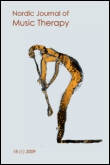
Nordic Journal of Music Therapy
Scope & Guideline
Connecting Research and Practice in Music Therapy
Introduction
Aims and Scopes
- Therapeutic Applications of Music:
The journal explores diverse applications of music therapy across various populations, including children, adults, and elderly individuals, particularly in clinical and community settings. - Interdisciplinary Approaches:
It emphasizes collaborations with other disciplines such as psychology, occupational therapy, and education, highlighting the integrative role of music in therapeutic practices. - Research Methodologies:
The journal publishes studies employing a variety of research methodologies, including qualitative, quantitative, mixed-methods, and systematic reviews, to provide a comprehensive understanding of music therapy's effectiveness. - Cultural and Contextual Sensitivity:
A consistent focus on the cultural and contextual factors influencing music therapy practice, ensuring that interventions are relevant and sensitive to the needs of diverse populations. - Innovations in Music Therapy:
The journal supports the exploration of technological advancements and innovative practices in music therapy, including the use of digital platforms and teletherapy. - Ethical Considerations:
It addresses ethical concerns and professional standards in music therapy practice, reflecting the evolving landscape of healthcare and therapeutic interventions.
Trending and Emerging
- Impact of Technology on Music Therapy:
There is a growing interest in the role of technology in music therapy, including teletherapy and digital interventions, particularly in response to the COVID-19 pandemic. - Trauma-Informed Approaches:
Research focusing on trauma-informed care and its integration into music therapy practices is trending, reflecting a heightened awareness of the impact of adverse childhood experiences and other traumas. - Mental Health and Well-Being:
The journal is increasingly focusing on music therapy's role in addressing mental health issues, with numerous studies exploring its effects on anxiety, depression, and recovery from substance use disorders. - Cultural Responsiveness and Diversity:
Emerging themes include the importance of cultural sensitivity and the application of music therapy across diverse cultural contexts, ensuring inclusivity in therapeutic practices. - Neuroscience and Music Therapy:
There is a notable trend towards incorporating neuroscience research to understand the mechanisms by which music therapy influences cognitive and emotional processes. - Parent and Family Involvement:
Research on the involvement of parents and families in music therapy interventions, particularly in pediatric settings, is gaining prominence, highlighting the relational aspects of therapy.
Declining or Waning
- Traditional Music Therapy Techniques:
There is a noticeable decline in publications centered around traditional music therapy methods, such as Guided Imagery and Music (GIM) or other classical techniques, as the field shifts towards more modern and integrative approaches. - Generalized Approaches to Music Therapy:
Research that applies a one-size-fits-all approach to music therapy is becoming less common, with a growing emphasis on personalized and context-specific interventions. - Focus on Music Therapy in Isolation:
Studies that examine music therapy in isolation, without consideration of interdisciplinary or holistic approaches, are appearing less frequently, reflecting a shift toward more integrative practices. - Purely Quantitative Studies:
There is a decrease in purely quantitative studies lacking qualitative insights, as the journal increasingly values mixed-methods research that captures the complexities of therapeutic processes. - Limited Scope on Historical Perspectives:
Discussion of historical perspectives and traditional practices in music therapy is declining, as the journal focuses on contemporary issues and future directions.
Similar Journals
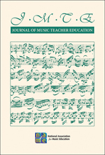
Journal of Music Teacher Education
Transforming Music Education Through Research.The Journal of Music Teacher Education, published by SAGE Publications Inc, is a leading scholarly outlet dedicated to advancing the field of music education. With an ISSN of 1057-0837 and an E-ISSN of 1945-0079, this journal explores a wide array of topics pertinent to music teaching and learning, serving as a vital resource for both researchers and practitioners in the music education community. Since its inception in 1991, it has consistently been positioned among the top-tier journals in both music and education, achieving a notable Q1 ranking in music and Q2 in education as of 2023. With impressive Scopus rankings, placing it in the 89th percentile for music and 47th percentile for education, the journal plays a crucial role in facilitating dialogue and disseminating innovative research aimed at improving music pedagogy. While not an open-access publication, it provides access to invaluable insights and practices that inform both theory and application in music education, making it an essential read for educators, students, and researchers alike, as they navigate the evolving landscape of music teaching. Explore the latest findings and thought-provoking discussions that shape the future of music education in the United States and beyond.
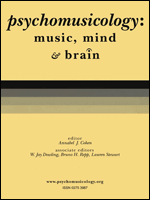
Psychomusicology
Advancing Insights at the Intersection of Music and MindPsychomusicology is a premier journal dedicated to the interdisciplinary exploration of the intersection between psychology and music. Published by the American Psychological Association, this esteemed publication serves as a vital resource for researchers, professionals, and students keen on understanding the profound impact of music on human cognition, emotion, and behavior. With a commitment to publishing high-quality research, Psychomusicology offers insights into diverse topics ranging from music perception and performance to the therapeutic applications of music. By fostering a community of scholars interested in the psychological aspects of music, the journal aims to advance empirical research and stimulate innovative thinking in the field. The ISSN for print is 0275-3987, while the electronic version can be accessed under E-ISSN 2162-1535. Unfortunately, the journal currently does not offer Open Access options, but it remains an essential reference for those engaged in the psychological and musical disciplines, promoting an enriched understanding of how music shapes the human experience.
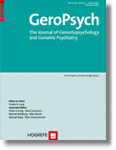
GeroPsych-The Journal of Gerontopsychology and Geriatric Psychiatry
Shaping the Future of Geriatric Mental HealthGeroPsych - The Journal of Gerontopsychology and Geriatric Psychiatry, published by HOGREFE AG, stands as an essential academic resource in the evolving fields of gerontology and geriatric psychiatry. With a commitment to advancing the understanding of psychological well-being in older adults, the journal provides a platform for high-quality research, discussion, and innovation that caters to researchers, practitioners, and students alike. Although currently not an open-access publication, GeroPsych ensures accessibility through various academic libraries and institutions, fostering a collaborative approach to the complexities of aging and mental health. Recognized within the Q3 category for Geriatrics and Gerontology, and with its impact reflected in Scopus rankings, this journal plays a pivotal role in informing best practices and shaping policies within the interdisciplinary landscape of geriatric care. Spanning research from 2010 to 2024, GeroPsych is positioned as a leading journal for those committed to improving the mental health and psychological resilience of the aging population.

Information and Communication Technology in Musical Field
Illuminating the Digital Symphony of Modern MusicInformation and Communication Technology in Musical Field is an esteemed academic journal published by MEDIA MUSICA, dedicated to exploring the intersections of technology and music. With an ISSN of 2067-9408 and an E-ISSN of 2069-654X, this journal serves as a vital resource for researchers, professionals, and students interested in the latest advancements and applications of information and communication technologies within the musical sphere. While specific impact factor metrics are currently unavailable, the journal aims to provide a platform for high-quality research that fosters innovation in music production, distribution, and theory. The implications of technology in music are profound, influencing everything from composition to performance and consumption, and this journal strives to illuminate these transformative changes. Located in Cluj-Napoca, Romania, at STR ICBRATIANU NR 25, this publication encourages submissions that contribute to the diverse dialogue surrounding music and technology, ensuring that it remains an essential reference for those at the forefront of this dynamic field.
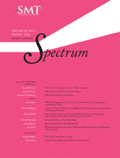
MUSIC THEORY SPECTRUM
Illuminating Insights in Musical AnalysisMUSIC THEORY SPECTRUM, published by Oxford University Press, serves as a premier journal in the field of music theory, recognized for its significant contributions and scholarship since its inception. With an ISSN of 0195-6167 and E-ISSN 1533-8339, this journal has established a distinguished position within the academic community, boasting an impressive Q1 status in the Music category for 2023 and ranking #17 out of 180 in Scopus for Arts and Humanities, Music, placing it within the 90th percentile. Despite its non-open access format, MUSIC THEORY SPECTRUM offers a wealth of research articles, reviews, and theoretical discussions aimed at both seasoned scholars and students alike. It spans from 1981 until present, fostering critical engagement and advancing understanding within the discipline. Researchers and music theorists will find this journal an invaluable resource for the latest insights and methodologies in music theory.
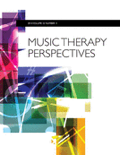
Music Therapy Perspectives
Transforming Lives through the Art of Music Therapy.Music Therapy Perspectives is a premier academic journal published by Oxford University Press, dedicated to advancing the understanding and practice of music therapy within the fields of Applied Psychology, Complementary and Alternative Medicine, and Music. With an impressive impact factor reflected in its 2023 Category Quartiles—ranking Q3 in Applied Psychology, Q2 in Complementary and Alternative Medicine, and Q1 in Music—this journal prides itself on providing a vital platform for research, clinical practices, and theoretical discussions. The journal is recognized for its robust contribution to the music therapy community, offering access to cutting-edge research that informs practitioners, educators, and students alike. As such, Music Therapy Perspectives is an essential resource for those seeking to explore the therapeutic applications of music in various settings, enhancing both academic inquiry and practical application in the field.

Muzikoloski Zbornik
Unlocking the Secrets of Sound and TheoryMuzikoloski Zbornik is a prominent open-access journal in the field of musicology, published by the esteemed University of Ljubljana Press since 1965. Hailing from Slovenia, this journal has been dedicated to advancing the study of musical heritage, theory, and practice, serving as a vital platform for researchers, professionals, and students alike. With a notable Q2 category ranking in the field of music and a Scopus ranking of 109 out of 180 in Arts and Humanities, Muzikoloski Zbornik showcases high-quality research, fostering discourse and collaboration among scholars globally. The journal embraces a diverse range of topics, from ethnomusicology to music education, ensuring its relevance in an ever-evolving academic landscape. By providing unrestricted access to its content, it champions the dissemination of knowledge and supports the growth of the musicology discipline.
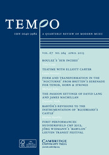
TEMPO
Where Tradition Meets Contemporary Music DiscourseTEMPO, a renowned journal published by Cambridge University Press, is dedicated to the expansive field of music studies. With its rich history dating back to 1939, the journal has significantly evolved, offering researchers, professionals, and students a platform to explore diverse musical perspectives and innovations. Serving as a vital resource in its category, TEMPO is currently positioned in the Q2 quartile within the field of Music, reflecting its quality and academic influence. Although it operates under a traditional subscription model, its impactful contributions to music scholarship are underscored by its active engagement with contemporary issues in musicology, performance, and education. Researchers can rely on TEMPO for cutting-edge analyses, reviews, and critical discourse that shape the understanding of music in society.
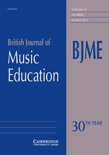
British Journal of Music Education
Empowering Educators with Cutting-Edge InsightsBritish Journal of Music Education is a prestigious academic publication dedicated to advancing the field of music education. Published by Cambridge University Press, it benefits from a notable impact factor that positions it in the Q2 category in Education and the Q1 category in Music as of 2023. This journal serves as a vital platform for researchers, educators, and students alike, focusing on innovative research, pedagogical studies, and theoretical discussions that shape the practice of music education globally. Since its inception in 1984, the journal has contributed significantly to the understanding of music pedagogy and continues to be relevant and influential, currently spanning the years from 1984 to 1998 and 2007 to 2024. With impressive rankings, including rank #16/180 in Arts and Humanities (Music) and rank #669/1543 in Social Sciences (Education) on Scopus, it highlights the journal's commitment to scholarly excellence. Though it does not currently offer open access, its contributions are an essential resource for anyone involved in the education landscape of music.
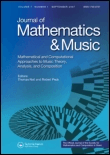
Journal of Mathematics and Music
Where Equations Meet Melodies.Journal of Mathematics and Music, published by TAYLOR & FRANCIS LTD, serves as a unique interdisciplinary platform that explores the intricate connections between mathematical principles and musical structures. With an ISSN of 1745-9737 and an E-ISSN of 1745-9745, this journal has made significant strides since its inception in 2007, converging its insights through to 2024. Positioned in a competitive landscape with a 2023 ranking of Q1 in Music and Q3 in several mathematics categories, it boasts a commendable Scopus rank of 19/180 in Arts and Humanities - Music. This journal emphasizes the mathematical models that underlie musical compositions and theoretical frameworks, appealing to a diverse audience of researchers, professionals, and students alike. For those interested in strengthening their understanding of the relationship between these two fields without the constraints of open access, the Journal of Mathematics and Music provides a vital resource for fostering innovative thought and collaboration across disciplines. Join leading minds in both music and mathematics as they contribute to this dynamic field of study.